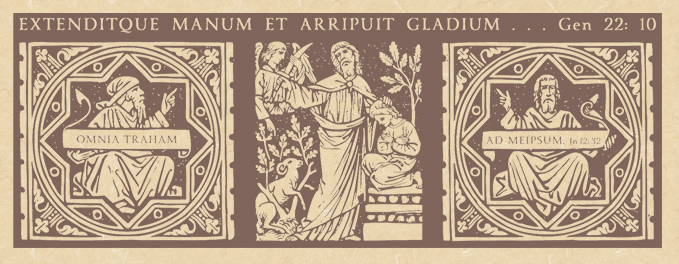The Quid Pro Quo of Christian Living.
The Eleventh Friday of Ordinary Time.
Lessons from the secondary feria, according to the ordinary form of the Roman Rite:
• II Kings 11: 1-4, 9-18, 20.
• Psalm 132: 11-14, 17-18.
• Matthew 6: 19-23.
The Third Class Feast of Saint Gregory Barbarigo, Bishop & Confessor.*
Lessons from the common, according to the extraordinary form of the Roman Rite:
• Ecclesiasticus 44: 16-27; 45: 3-20.
• [Gradual] Ecclesiasticus 44: 16, 20.
• Matthew 25: 14-23.
The Fourth Friday of the Apostles Fast; the Feast of the Holy Martyrs Manuel, Sabel & Ishmael;** and, the Feast of Our Venerable Father Hypatius, Hegumen of the Rufenianos Monastery.
First & third lessons from the pentecostarionm, second & fourth from the menaion, according to the Ruthenian recension of the Byzantine Rite:
• Romans 16: 1-16.
• Ephesians 6: 10-17.
• Matthew 13: 4-9.
• Luke 21: 12-19.
FatherVenditti.com
|
 9:19 AM 6/17/2016 — Yesterday we focused on the Gospel lesson about the Lord's Prayer, as all the Gospel lessons this week have been our Lord's lessons on prayer. Last week we focused on the first lessons which were about the various activities of the Prophet Elijah in the First Book of Kings. Today we move back to the first lesson again, this time coming from the Second Book of Kings, which is very thick going indeed. It's almost like trying to read the The Lord of the Rings: it makes sense when you watch the distilled version in the movie, but if you actually try and read the book it can be very confusing. And since the homily at a weekday Mass—if there is one—should be very brief indeed, it doesn't make sense to try and tackle anything from the Second Book of Kings. But today we might give it a shot. 9:19 AM 6/17/2016 — Yesterday we focused on the Gospel lesson about the Lord's Prayer, as all the Gospel lessons this week have been our Lord's lessons on prayer. Last week we focused on the first lessons which were about the various activities of the Prophet Elijah in the First Book of Kings. Today we move back to the first lesson again, this time coming from the Second Book of Kings, which is very thick going indeed. It's almost like trying to read the The Lord of the Rings: it makes sense when you watch the distilled version in the movie, but if you actually try and read the book it can be very confusing. And since the homily at a weekday Mass—if there is one—should be very brief indeed, it doesn't make sense to try and tackle anything from the Second Book of Kings. But today we might give it a shot.
To make a very long story very short, King Jehoram is dead, and his rightful heir, Jehoiada, is pushed out by the usurper, Ahaziah, and his mother, Athaliah. Ahaziah is killed, and Athaliah decides to rule in his stead, but she is not devout, and takes the people away from the covenant with the Lord and lapses into the worship of the pagan god, Baal, the same pagan god that Elijah embarrassed last week. Jehoiada, who has been hidden away in the Temple of the Lord all this time, emerges to overthrow Athaliah, orders the temples of Baal to be destroyed, kills all the pagan priests, and restores the covenant with the Lord. Somehow, I don't think the movie version is forthcoming.
Our separated brethren have always had a problem with Catholic teaching on the Covenant because it offends their Protestant sensibilities; and, because we live in a Protestant society, it can effect how we think about our faith as well. We tend to rebel against the idea of a quid pro quo, that if I do this, than God will do that; but, this has been a part of Salvation History since the days of Abraham: it pervades the Old Testament, it's reflected in the many moral lessons of our Lord in the Gospels, in the Church's centuries-old teaching about indulgences, and is especially present in the Message of Fatima, wherein Our Lady makes certain requests of us, in return for which we will receive certain graces. Not only is it not un-Scriptural, it is a recurring theme in Holy Writ.
King David lights upon this in our Responsorial Psalm today, when he sings, “...if thy sons hold fast to my covenant, to the decrees which I make known to them, their sons too shall reign on thy throne for ever” (132: 12 Knox).
Let us pray during this Mass, and each day of our lives, that we will continually renew our commitment to living out our covenant with God, which begins with our obedience to the Ten Commandments, and finds its flourishing in our joyful acceptance of the teachings of Holy Mother Church.

* The Cardinal Archbishop of Padua, Gregory Barbarigo died in 1697 with a reputation similar to Charles Borromeo, renowned for his zeal in the reform of both the clergy and the laity, and his extreme devotion to the poor of his diocese.
** Manuel, Sabel and Ishmael were Persian messengers sent by King Sapor II to negotiate peace with Emperor Julian the Apostate, who had them beheaded when they refused to renounce their Christian Faith. The lessons from the menaion are for them.
|

